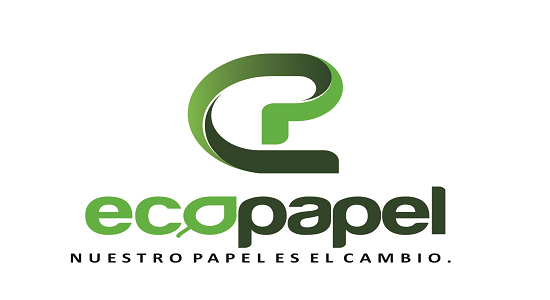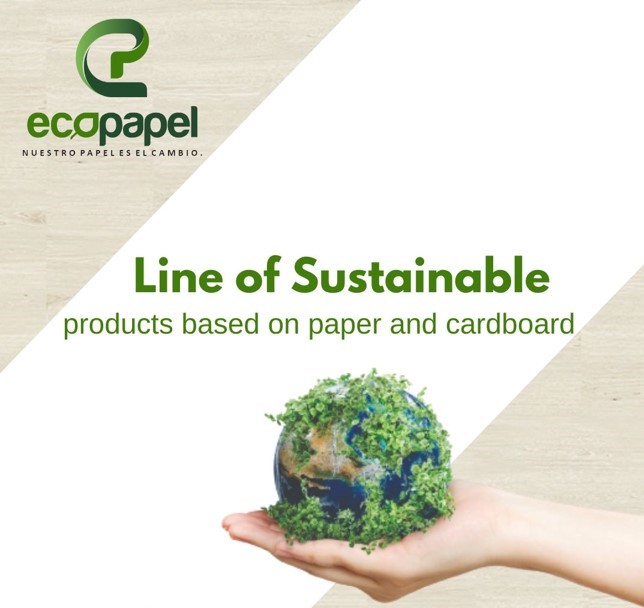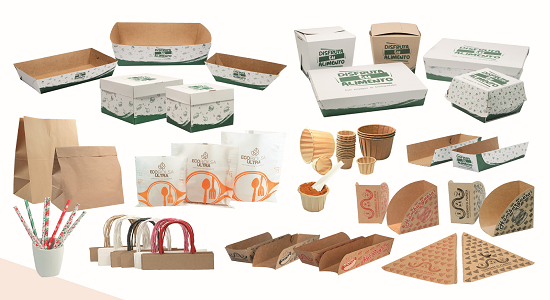Positioning a family business towards sustainability
CALI FOOD PAPERS S.A.S. is a Colombian company specialised in paper- and cardboard-based packaging for the food industry as well as the packaging of products in general. Since 2019 the company decided to commit to sustainability and focus on biodegradable and compostable paper- and cardboard-based packaging.
“The demand for paper as a biodegradable and recyclable material increases every year. However, the industry's supply is scarce. This supply deficit is due to two factors: production capacity and pulp supply.”
, Manuel Rivera, Marketing and Product Design Manager, explains. In addition, in June 2022 the Colombian Senate passed a bill to regulate the use of single-use, non-reusable plastic. All these facts led the company to offer packaging and utensils made from renewable raw materials that also meet the necessary requirements for food packaging. And so, the idea of a new line of products called ECOPAPEL was born.
Biodegradable paper-based packaging
What makes ECOPAPEL product line unique? ECOPAPEL is a line of paper-based products: biodegradable, compostable, made from renewable raw materials, reusable, certified for contact with food, which seek to be a solution for the replacement of highly polluting materials and widely used in disposable supplies in the food industry such as: plastics, aluminium foil, waxed paper, etc..
“The biodegradability of oxoplastics (oxo-biodegradable) and bioplastics (made from cassava, corn, avocado, etc.) in real environmental contexts is still questioned, since, for example, to be composted, bioplastics need an industrial facility where the necessary conditions for the decomposition of these plastics are provided and controlled over time. They cannot simply be composted in the garden compost bin. Moreover, such as industrial facilities for the controlled decomposition often don’t exist. In the case of oxoplastics, the release of microplastics from their decomposition is highly questioned. For these reasons, in some countries they are even banned. Our food papers are biodegradable and compostable and can be disposed of in organic waste”
, Manuel Rivera stated. ECOPAPEL applies new technologies developed around the world to increase the resistance of paper and cardboard to grease and moisture, and to reduce oxygen transfer. Furthermore, ECOPAPEL materials allow the reduction in the use of inputs for cooking, such as grease, oils and release agents, that are the main water pollutants. At the same time, ECOPAPEL materials also reduce washing cycles and contribute to cleaner and more hygienic environments. They work with suppliers only with high quality and certified raw materials by the FDA (U.S. Food and Drug Administration), ISEGA (Institute for the Safety of Food, Consumer Products and Cosmetics) and others with favourable INVIMA (The National Drug and Food Regulatory Agency) concept. In comparison, oxoplastics are not FDA or ISEGA certified and very few bioplastics have been able to obtain either of these certifications for contact with food.
ECOPAPEL products include anti-fat/anti-humidity bags, straws, anti-grease and moisture-resistant films, paper cups, cutlery packaging, backing paper, spoons, and food folding boxes. Their corporate philosophy is to be a benchmark for the transformation towards an increasingly ecological and sustainable industry and in this way, contribute to the preservation of life on the planet.
One of the challenges ECOPAPEL has encountered, is sensibilisation of customers why sustainable packaging matters and what are the advantages. For this reason, the company started a series of videos as an educational campaign. The start-up focuses on the Colombian market with a view to expanding into neighboring countries, as well as the Caribbean islands and Miami. This is because Colombia has a strategically advantageous position.
ECOPAPEL that has in the meantime 30 workers, is just the beginning of their sustainability journey. The long-term goal is to build a industrial ecosystem with other packaging converters, paper producing companies and raw materials providers to produce paper from pulp made from industrial waste (biomass). They already cooperate with some local companies, such as GREENPULP, a paper mill that processes post-industrial materials rich in paper cellulose. GREENPULP is also part of the ISC3 Global Start-up Service.
Next steps at ECOPAPEL
ECOPAPEL is currently looking for stakeholders investing in an environmentally sustainable industrial paper mill, capable of sourcing diverse biomass sources. The objective is to become a relevant player in supplying the demand for paper and cardboard packaging for products and food in Colombia, Central and South America, replacing single-use plastics, as well as fulfilling various paper needs in the market.
With their innovative approach, ECOPAPEL who joined the ISC3 Global Start-up Service in 2022 contributes to SDG 9 (Industry, Innovation and Infrastructure), SDG 12 (Responsible Consumption and Production), and SDG 15 (Life on Land).




